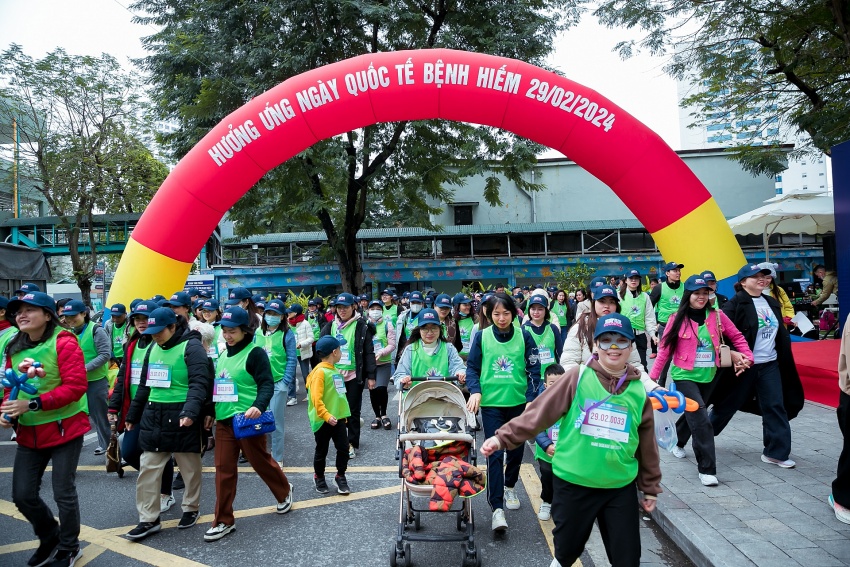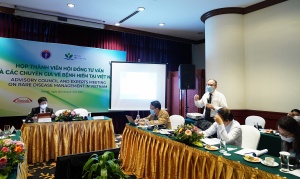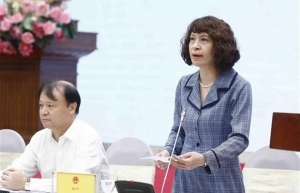Connecting rare traits into pathways for rare disease patients
From February 25 to 28, Sanofi Vietnam teamed up with the Vietnam National Children's Hospital and Children's Hospital 1 (Ho Chi Minh City) to organise a series of events in response to "Rare Disease Day", contributing to raising community awareness to increase support for patients and their families.
 |
According to estimates by the World Economic Forum (WEF), each rare disease hits less than 0.05 per cent of the population, but 7,000 rare diseases have been discovered that greatly affect more than 5 per cent of the global population (400-475 million people)1. In Vietnam, the World Health Organization (WHO) also recorded that there are about 100 rare diseases and 1 in 15 people suffer from them, which means there are more than 6 million patients.
Patients with rare diseases have been facing many challenges that affect their quality of life, such as delayed diagnosis due to scarcity of information about the disease, the lack of available treatments as only 5 per cent of rare diseases have FDA-approved treatments, and high healthcare costs that force many patients to turn to their government or local organisations and society for support.
Patients with rare diseases are often medically vulnerable, with 50 per cent being children, and 30 per cent of paediatric patients dying before the age of 5.
Associate Professor Dr Vu Chi Dung, director of the Centre of Endocrinology, Metabolism, Genetics and Molecular Therapy, Vietnam National Children's Hospital, said, "Diagnosing, treating and caring for rare disease patients is not only a big challenge in our country but also for developed countries. Symptoms of rare diseases are easily confused with common diseases, leading to misdiagnosis; Limited information about the cause of the disease, pathogenesis and treatment methods are also an issue, while most rare diseases require lifelong care because 80 per cent are genetic and 70 per cent manifest in childhood. Only about 5 per cent of rare diseases have certified drugs to treat, the rest are supportive treatments, and treatment costs are very high.”
“Therefore, to promote positive changes to help patients with rare diseases and their families and caregivers, we need policymakers, healthcare providers, relevant ministries, pharmaceutical companies, medical staff, and the whole community to work together,” he added.
With enough help and companionship from the community, people with rare diseases still have many opportunities to improve their lives. The power of each individual, family, medical expert, pharmaceutical researcher and policymaker is an important part of the journey to opening hope for patients.
As an innovative pharmaceutical company with multiple solutions being applied in the field of rare disease treatment, Sanofi has been working to open brighter paths for patients by supporting high-risk screening for early diagnosis of some congenital metabolic disorders, sponsoring training for medical professionals in diagnosis and treatment, and connecting stakeholders to build sustainable national policies for people with rare diseases.
Sanofi's International Charitable Access Program (ICAP) has supported free enzyme replacement therapy for many patients without access to medication since 1997. For the past 27 years, ICAP has sponsored 59 Pompe patients, 11 Gaucher patients, 10 MPS I patients, and 16 MPS II patients in Vietnam.
Emin Turan, foundation general manager and country lead of Sanofi Vietnam, emphasised, “Sanofi has more than 40 years experience researching and making pioneering efforts to support rare disease treatment around four commitments: promoting faster and more accurate diagnosis; continuously researching and promoting the role of innovative medicines in treating and improving patients' lives; developing commercial capabilities and a global network to increase access to innovative healthcare solutions for patients around the world; and contributing to raising public awareness about rare diseases.”
“Although we have dedicated resources over decades, there is still a lot of work to do with the community to speed up the time it takes for patients to get the support they need and minimise the burden on health and quality of life. We believe that each individual, each family, each organisation, each medical professional, each pharmaceutical researcher, and each policymaker has different necessary roles. Together, it will open brighter paths for patients with rare diseases,” he added.
 | Stakeholders seek to enhance quality of rare disease treatment in Vietnam National Children’s Hospital and the Medical Services Administration under Vietnam’s Ministry of Health on December 2 jointly held the Advisory Council and Experts Meeting on Rare Disease Management in Vietnam. |
 | Improving quality of life for rare disease patients in Vietnam Over the past few years, Vietnam has placed more focus on rare diseases and enhanced rare disease capabilities in diagnosis, treatment, and management guidelines for some rare diseases. To advance this progress, the Vietnamese Ministry of Health has explored collaborating in public-private partnerships with various stakeholders such as pharmaceutical companies. Katharina Geppert, country manager of Takeda Vietnam, talked with VIR about their contributions to rare diseases in Vietnam. |
 | Domestic pharmaceutical firms encouraged to produce rare medicines: official The Ministry of Health (MoH) will propose to the Government to issue policies aimed at encouraging domestic pharmaceutical enterprises to produce rare medicines in order to ensure domestic supply, said Deputy Minister of Health Nguyen Thi Lien Huong said at the Government’s regular press conference on October 29. |
What the stars mean:
★ Poor ★ ★ Promising ★★★ Good ★★★★ Very good ★★★★★ Exceptional
Themes: Healthcare Platform
- Opella and Long Chau join forces to enhance digestive and bone health
- Hanoi intensifies airport monitoring amid Nipah disease risks
- Cosmetics rules set for overhaul under draft decree
- Policy obstacles being addressed in drug licensing and renewal
- Sanofi, Long Chau Pharmacy relaunch medicine blister pack collection initiative
Related Contents
Latest News
More News
- Hanoi intensifies airport monitoring amid Nipah disease risks (January 29, 2026 | 15:21)
- 14th National Party Congress wraps up with success (January 25, 2026 | 09:49)
- Congratulations from VFF Central Committee's int’l partners to 14th National Party Congress (January 25, 2026 | 09:46)
- List of newly-elected members of 14th Political Bureau announced (January 23, 2026 | 16:27)
- 14th Party Central Committee unanimously elects To Lam as General Secretary (January 23, 2026 | 16:22)
- List of members of 14th Party Central Committee announced (January 23, 2026 | 09:12)
- Highlights of fourth working day of 14th National Party Congress (January 23, 2026 | 09:06)
- Press provides timely, accurate coverage of 14th National Party Congress (January 22, 2026 | 09:49)
- Press release on second working day of 14th National Party Congress (January 22, 2026 | 09:19)
- Minister sets out key directions to promote intrinsic strength of Vietnamese culture (January 22, 2026 | 09:16)

 Tag:
Tag:




















 Mobile Version
Mobile Version